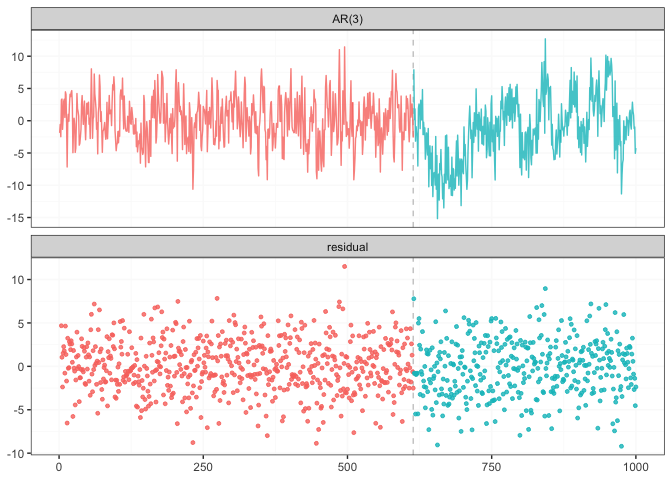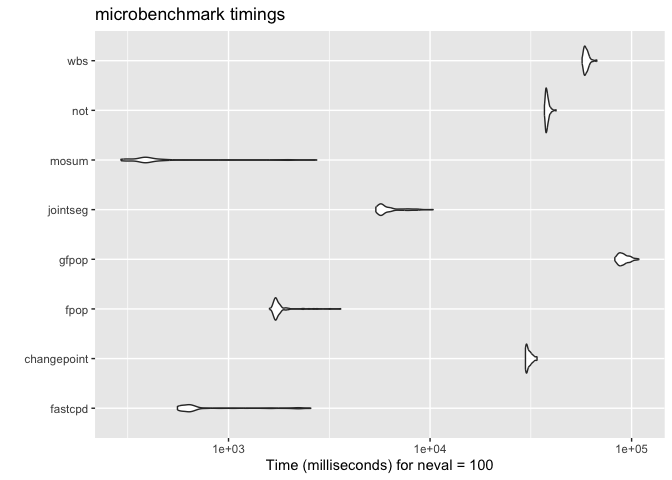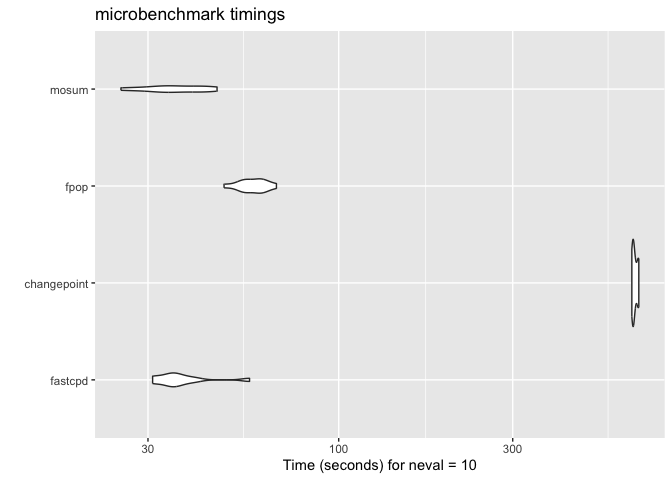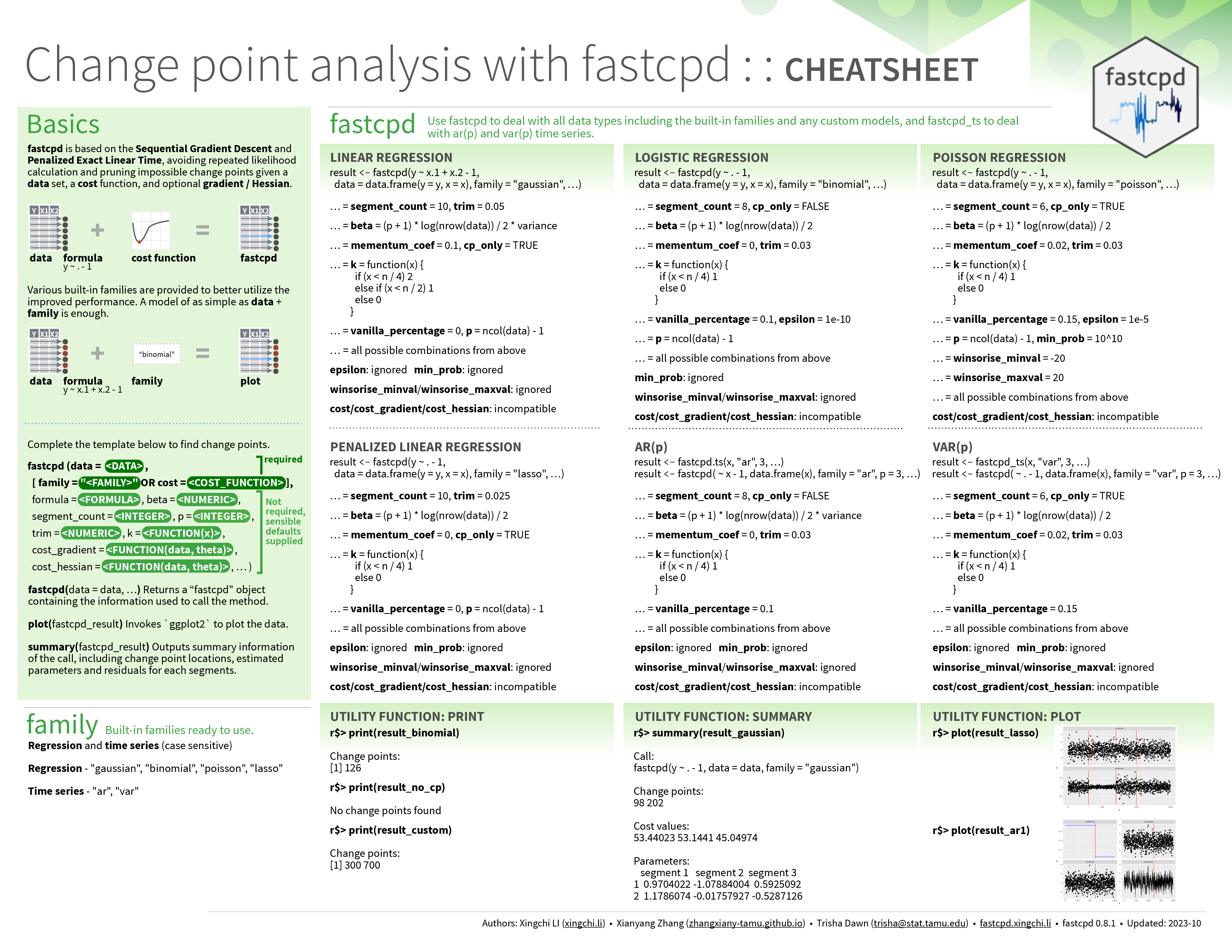Fast Change Point Detection via Sequential Gradient Descent.
fastcpd: Fast Change Point Detection in R 
Overview
The fastcpd (fastchange point detection) is a fast implmentation of change point detection methods in R. The fastcpd package is designed to find change points in a fast manner. It is easy to install and extensible to all kinds of change point problems with a user specified cost function apart from the built-in cost functions.
To learn more behind the algorithms:
- fastcpd: Fast Change Point Detection in R
- Sequential Gradient Descent and Quasi-Newton’s Method for Change-Point Analysis
Installation
install.packages(
"fastcpd",
repos = c("https://doccstat.r-universe.dev", "https://cloud.r-project.org")
)
Development version
pak::pak("doccstat/fastcpd")
devtools::install_github("doccstat/fastcpd")
With mamba or conda (available soon)
# conda-forge is a fork from CRAN and may not be up-to-date
# Use mamba
mamba install r-fastcpd
# Use conda
conda install -c conda-forge r-fastcpd
Usage
set.seed(1)
n <- 1000
x <- rep(0, n + 3)
for (i in 1:600) {
x[i + 3] <- 0.6 * x[i + 2] - 0.2 * x[i + 1] + 0.1 * x[i] + rnorm(1, 0, 3)
}
for (i in 601:1000) {
x[i + 3] <- 0.3 * x[i + 2] + 0.4 * x[i + 1] + 0.2 * x[i] + rnorm(1, 0, 3)
}
result <- fastcpd::fastcpd.ar(x[3 + seq_len(n)], 3, r.progress = FALSE)
summary(result)
#>
#> Call:
#> fastcpd::fastcpd.ar(data = x[3 + seq_len(n)], order = 3, r.progress = FALSE)
#>
#> Change points:
#> 614
#>
#> Cost values:
#> 2754.116 2038.945
#>
#> Parameters:
#> segment 1 segment 2
#> 1 0.57120256 0.2371809
#> 2 -0.20985108 0.4031244
#> 3 0.08221978 0.2290323
plot(result)

Note
r.progress = FALSE is used to suppress the progress bar. Users are expected to see the progress bar when running the code by default.
Comparison
library(microbenchmark)
set.seed(1)
n <- 5 * 10^6
mean_data <- c(rnorm(n / 2, 0, 1), rnorm(n / 2, 50, 1))
ggplot2::autoplot(microbenchmark(
fastcpd = fastcpd::fastcpd.mean(mean_data, r.progress = FALSE, cp_only = TRUE, variance_estimation = 1),
changepoint = changepoint::cpt.mean(mean_data, method = "PELT"),
fpop = fpop::Fpop(mean_data, 2 * log(n)),
gfpop = gfpop::gfpop(
data = mean_data,
mygraph = gfpop::graph(
penalty = 2 * log(length(mean_data)) * gfpop::sdDiff(mean_data) ^ 2,
type = "updown"
),
type = "mean"
),
jointseg = jointseg::jointSeg(mean_data, K = 12),
mosum = mosum::mosum(c(mean_data), G = 40),
not = not::not(mean_data, contrast = "pcwsConstMean"),
wbs = wbs::wbs(mean_data)
))
#> Warning in microbenchmark(fastcpd = fastcpd::fastcpd.mean(mean_data, r.progress
#> = FALSE, : less accurate nanosecond times to avoid potential integer overflows

library(microbenchmark)
set.seed(1)
n <- 10^8
mean_data <- c(rnorm(n / 2, 0, 1), rnorm(n / 2, 50, 1))
system.time(fastcpd::fastcpd.mean(mean_data, r.progress = FALSE, cp_only = TRUE, variance_estimation = 1))
#> user system elapsed
#> 11.753 9.150 26.455
system.time(changepoint::cpt.mean(mean_data, method = "PELT"))
#> user system elapsed
#> 32.342 9.681 66.056
system.time(fpop::Fpop(mean_data, 2 * log(n)))
#> user system elapsed
#> 35.926 5.231 58.269
system.time(mosum::mosum(c(mean_data), G = 40))
#> user system elapsed
#> 5.518 11.516 38.368
ggplot2::autoplot(microbenchmark(
fastcpd = fastcpd::fastcpd.mean(mean_data, r.progress = FALSE, cp_only = TRUE, variance_estimation = 1),
changepoint = changepoint::cpt.mean(mean_data, method = "PELT"),
fpop = fpop::Fpop(mean_data, 2 * log(n)),
mosum = mosum::mosum(c(mean_data), G = 40),
times = 10
))
#> Warning in microbenchmark(fastcpd = fastcpd::fastcpd.mean(mean_data, r.progress
#> = FALSE, : less accurate nanosecond times to avoid potential integer overflows

Some packages are not included in the microbenchmark comparison due to either memory constraints or long running time.
# Device: Mac mini (M1, 2020)
# Memory: 8 GB
system.time(CptNonPar::np.mojo(mean_data, G = floor(length(mean_data) / 6)))
#> Error: vector memory limit of 16.0 Gb reached, see mem.maxVSize()
#> Timing stopped at: 0.061 0.026 0.092
system.time(ecp::e.divisive(matrix(mean_data)))
#> Error: vector memory limit of 16.0 Gb reached, see mem.maxVSize()
#> Timing stopped at: 0.076 0.044 0.241
system.time(strucchange::breakpoints(y ~ 1, data = data.frame(y = mean_data)))
#> Timing stopped at: 265.1 145.8 832.5
system.time(breakfast::breakfast(mean_data))
#> Timing stopped at: 45.9 89.21 562.3
Cheatsheet
Function references
- Main function
- Wrapper functions
- Time series
- AR(p):
fastcpd_ar - ARIMA(p, d, q):
fastcpd_arima - ARMA(p, q):
fastcpd_arma - GARCH(p, q):
fastcpd_garch - VAR(p):
fastcpd_var - General time series:
fastcpd_ts
- AR(p):
- Unlabeled data
- Mean change:
fastcpd_mean - Variance change:
fastcpd_variance - Mean and/or variance change:
fastcpd_meanvariance
- Mean change:
- Regression data
- Logistic regression:
fastcpd_binomial - Penalized linear regression:
fastcpd_lasso - Linear regression:
fastcpd_lm - Poisson regression:
fastcpd_poisson
- Logistic regression:
- Time series
- Utility functions
- Variance estimation
- Variance estimation in ARMA models:
variance_arma - Variance estimation in linear models:
variance_lm - Variance estimation in mean change models:
variance_mean - Variance estimation in median change models:
variance_median
- Variance estimation in ARMA models:
- Variance estimation
- Class methods
- Data
- Bitcoin Market Price (USD):
bitcoin - Occupancy Detection Data Set:
occupancy - Transcription Profiling of 57 Human Bladder Carcinoma Samples:
transcriptome - UK Seatbelts Data:
uk_seatbelts - Well-log Dataset from Numerical Bayesian Methods Applied to Signal Processing:
well_log
- Bitcoin Market Price (USD):
- Main class
R Shiny App
Available soon: rshiny.fastcpd.xingchi.li
FAQ
Should I install suggested packages?
The suggested packages are not required for the main functionality of the package. They are only required for the vignettes. If you want to learn more about the package comparison and other vignettes, you could either check out vignettes on CRAN or pkgdown generated documentation.
I countered problems related to gfortran on Mac OSX or Linux!
The package should be able to install on Mac and any Linux distribution without any problems if all the dependencies are installed. However, if you encountered problems related to gfortran, it might be because RcppArmadillo is not installed previously. Try Mac OSX stackoverflow solution or Linux stackover solution if you have trouble installing RcppArmadillo.
We welcome contributions from everyone. Please follow the instructions below to make contributions.
Fork the repo.
Create a new branch from
mainbranch.Make changes and commit them.
- Please follow the Google’s R style guide for naming variables and functions.
- If you are adding a new family of models with new cost functions with corresponding gradient and Hessian, please add them to
src/fastcpd_class_cost.ccwith proper example and tests invignettes/gallery.Rmdandtests/testthat/test-gallery.R. - Add the family name to
src/fastcpd_constants.h. - [Recommended] Add a new wrapper function in
R/fastcpd_wrappers.Rfor the new family of models and move the examples to the new wrapper function as roxygen examples. - Add the new wrapper function to the corresponding section in
_pkgdown.yml.
Push the changes to your fork.
Create a pull request.
Make sure the pull request does not create new warnings or errors in
devtools::check().
Encountered a bug or unintended behavior?
- File a ticket at GitHub Issues.
- Contact the authors specified in DESCRIPTION.


